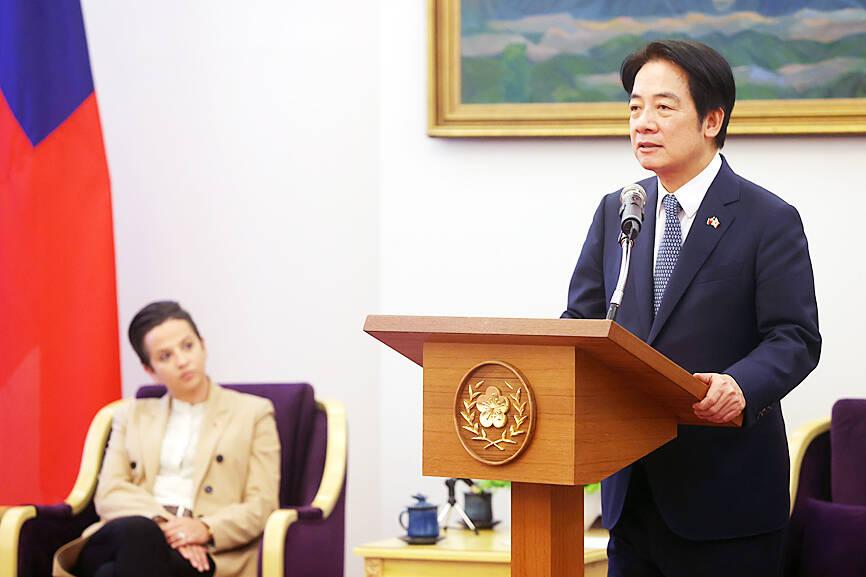Vice President William Lai (賴清德) spelled out his plan for preserving peace in the Taiwan Strait in a Wall Street Journal op-ed on Tuesday.
Lai — who is the Democratic Progressive Party’s (DPP) presidential candidate — in the article proposed four “pillars” of peace, beginning with the need for Taiwan to continue building its defense capabilities, to reduce “the risk of armed conflict by raising the stakes and the costs for Beijing.”
Expanding on the reforms made by President Tsai Ing-wen (蔡英文), Lai said he would expedite Taiwan’s transition into an asymmetric fighting force, while also focusing on civil defense, and greater cooperation with partners and allies.

Photo: CNA
The second pillar was the notion that “economic security is national security,” he wrote.
Despite Taiwan’s economic achievements, trade dependencies on China have created vulnerabilities that can be exploited through economic coercion, he said.
To ease that dependency, Taiwan must not only support its local industries, but also “foster secure supply chains while pursuing trade agreements that encourage trade diversification,” he said.
Lai stressed the importance of partnerships with democracies around the world.
The “record numbers” of visits in the past few years by think tanks, non-governmental organizations, parliamentarians and official delegations have shown Beijing that despite its pressure, Taiwan does not stand alone, he wrote.
The fourth component was a commitment to “steady and principled cross-strait leadership,” he said.
His top priorities in that area would be “pragmatism and consistency,” despite Beijing ratcheting up military and economic pressure on Taiwan, and cutting off established lines of communication, he said.
“I will support the cross-strait status quo — which is in the best interests of both the Republic of China, as Taiwan is formally known, and the international community,” he said. “I will [also] never rule out the possibility of dialogue without preconditions, based on the principles of reciprocity and dignity.”
On Monday, New Taipei City Mayor Hou You-yi (侯友宜) — the Chinese Nationalist Party’s (KMT) presidential candidate — told TVBS political talk show host Jaw Shaw-kong (趙少康) during an interview that his basic position was that cross-strait ties were of the highest priority and that stability in the Taiwan Strait would determine how military service is handled.
The cross-strait relationship has become dangerous under the DPP government and it had no choice but to extend compulsory military service to one year starting next year, Hou said.
Former Taipei mayor Ko Wen-je (柯文哲) — the Taiwan People’s Party chairman and presidential candidate — last month said that if elected president, he would restart talks on the cross-strait service trade agreement for closer economic integration with China.
Additional reporting by staff writer

SECURITY: As China is ‘reshaping’ Hong Kong’s population, Taiwan must raise the eligibility threshold for applications from Hong Kongers, Chiu Chui-cheng said When Hong Kong and Macau citizens apply for residency in Taiwan, it would be under a new category that includes a “national security observation period,” Mainland Affairs Council (MAC) Minister Chiu Chui-cheng (邱垂正) said yesterday. President William Lai (賴清德) on March 13 announced 17 strategies to counter China’s aggression toward Taiwan, including incorporating national security considerations into the review process for residency applications from Hong Kong and Macau citizens. The situation in Hong Kong is constantly changing, Chiu said to media yesterday on the sidelines of the Taipei Technology Run hosted by the Taipei Neihu Technology Park Development Association. With

CARROT AND STICK: While unrelenting in its military threats, China attracted nearly 40,000 Taiwanese to over 400 business events last year Nearly 40,000 Taiwanese last year joined industry events in China, such as conferences and trade fairs, supported by the Chinese government, a study showed yesterday, as Beijing ramps up a charm offensive toward Taipei alongside military pressure. China has long taken a carrot-and-stick approach to Taiwan, threatening it with the prospect of military action while reaching out to those it believes are amenable to Beijing’s point of view. Taiwanese security officials are wary of what they see as Beijing’s influence campaigns to sway public opinion after Taipei and Beijing gradually resumed travel links halted by the COVID-19 pandemic, but the scale of

A US Marine Corps regiment equipped with Naval Strike Missiles (NSM) is set to participate in the upcoming Balikatan 25 exercise in the Luzon Strait, marking the system’s first-ever deployment in the Philippines. US and Philippine officials have separately confirmed that the Navy Marine Expeditionary Ship Interdiction System (NMESIS) — the mobile launch platform for the Naval Strike Missile — would take part in the joint exercise. The missiles are being deployed to “a strategic first island chain chokepoint” in the waters between Taiwan proper and the Philippines, US-based Naval News reported. “The Luzon Strait and Bashi Channel represent a critical access

Pope Francis is be laid to rest on Saturday after lying in state for three days in St Peter’s Basilica, where the faithful are expected to flock to pay their respects to history’s first Latin American pontiff. The cardinals met yesterday in the Vatican’s synod hall to chart the next steps before a conclave begins to choose Francis’ successor, as condolences poured in from around the world. According to current norms, the conclave must begin between May 5 and 10. The cardinals set the funeral for Saturday at 10am in St Peter’s Square, to be celebrated by the dean of the College